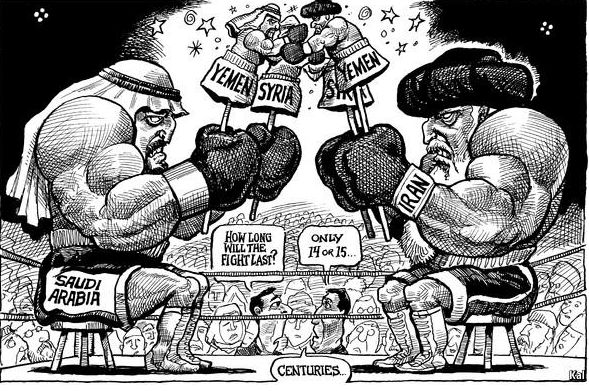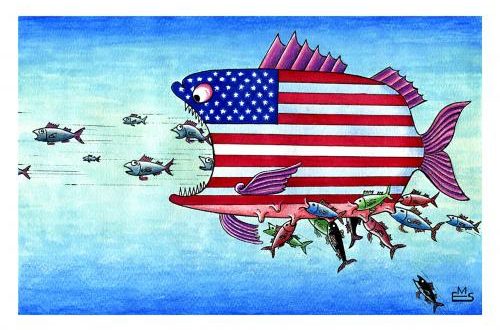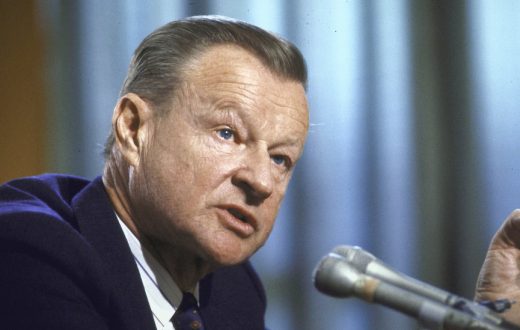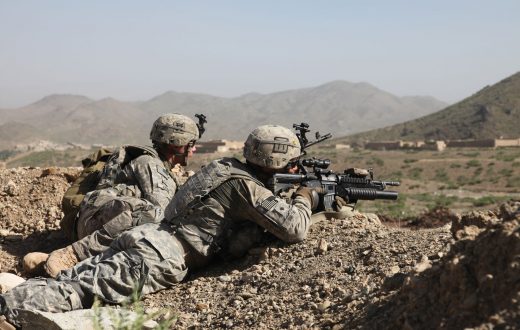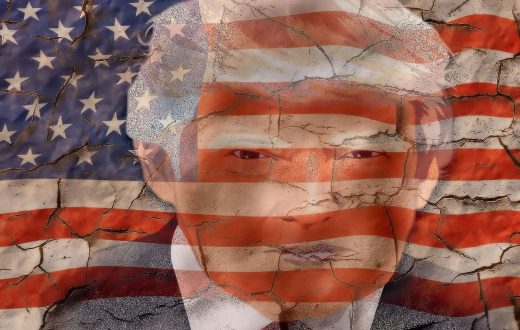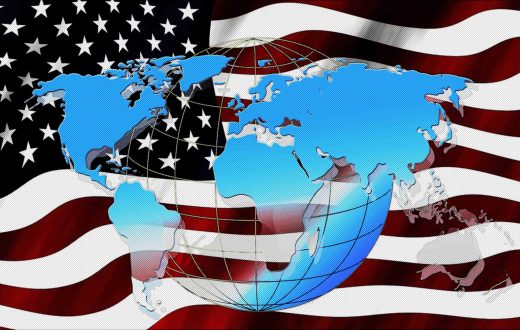Difficult strategic rebalancing in an area that flares up Washington overwhelmed by the confrontation between Riyadh and Tehran After a month of bombing, the coalition led by Saudi Arabia states favor a political solution to the Yemeni crisis. However, while its standoff with Iran, the Wahhabi kingdom does not rule out the option of a ground offensive against the Shiite Houthi rebellion. This prospect worries the Obama administration, which is struggling to maintain cohesion among its allies.
A late spring moved to Washington at the end of April. But neither the cherry blossoms or higher temperatures can reduce the atmosphere of latent anxiety and perplexity prevailing in the federal capital. The halls of Congress to Massachusetts Avenue the main research centers or meeting rooms Connecticut Avenue, the same questions return: what’s really going on in the Middle East and what should the United States to avoid s ‘stuck there again?
The civil war in Syria, the deadly actions of the Organization of the Islamic State (OEI), the bombings of Yemen by a coalition of nine Arab countries, not to mention sectarian violence between Sunnis and Shiites, daily make the “one” . But the American response strategy to these challenges seems unreadable. In Mashreq in full glow, the United States also are struggling to reassure their allies, be it Saudi Arabia, other oil monarchies, Egypt or Iraq.
The official visit of Iraqi Prime Minister Haidar al-Abadi, the first of its kind, and highlighted the permanent split which now seems doomed the administration of President Barack Obama. Washington has pledged $ 200 million to Baghdad to help displaced by fighting against the OEI, and its support for the granting of a loan of 700 million by the International Monetary Fund (IMF). This money is intended to offset the worsening of the Iraqi budget deficit in 2015 is expected to reach 25 billion dollars, equivalent to one third of the expected oil revenue for the same year.
In addition, US officials have never ceased to urge their partner to take over distances with Iranian leaders. “Iran should respect the sovereignty of Iraq and stop intervening unilaterally on Iraqi soil,” insisted Obama, accusing Tehran of supporting Shiite militias militarily fighting against the OEI without Refer to the Baghdad government. These militias are regularly accused of looting and violence against the civilian population, as in the recovery of the city of Tikrit, in late March.
Mr. Al-Abadi was initially downplayed the role of Iran in his country, saying that only a hundred military advisers were present. Then he and his companions have not missed an opportunity to greet both “diplomatic progress in the Iranian nuclear issue” and the “commitment” of Washington to find a final agreement on this issue by at the end of next June. “The message of Mr. Al-Abadi was clear. He said the United States that they could not both be closer to Iran, even tentatively, and at the same time criticize Iraq to be its ally, “says a US diplomat requires anonymity.
For this connoisseur of the Arab world, the United States does indeed know more about where they stand in the Middle East: “There are still a few years, our allies did not ask us the same problems of consistency. They were following the lines of our actions and we knew to give them enough slack to not force them to complete docility. Today we are continually forced to reconcile contradictory positions. “An opinion shared Ahmed Ali, a political scientist from the Empowering Youth for Peace in Iraq, a think tank based in Washington, and himself of Iraqi origin:” The Obama administration knows that the regime in Baghdad continue to seek a balance between the US and Iran, because it needs these two major players to defeat the OEI. “Other experts, like Richard Nephew of the Brookings Institution, a think tank close to the Democratic Party, meanwhile questioned the apparent paradox that drives the American president to curb any attempt by Congress to toughen sanctions against Iran, while using a tone somewhat martial against that country when it comes to discuss the situation in Iraq or Yemen.
The official visit of Mr. Al-Abadi especially illustrated another twinge, even more important, within the American sphere of influence in the Middle East. Evoking the air intervention of the coalition led by the Saudis to Yemen to counter the advance of the Houthi militia, Iraqi Prime Minister questioned the appropriateness of such action, saying that “Yemen’s problems solution First found in Yemen. ” Clearly, Baghdad pleaded for a return to national dialogue with the participation of Houthi, who took up arms to protest against a federal government project concocted by President Abd Rabbo Mansour Hadi (1).
More importantly, facing a small committee of journalists received at Blair House, the residence of foreign dignitaries invited to the White House, the Iraqi leader made it clear that the Obama administration shared his opinion. Like him, she considers that Saudi Arabia “is the main obstacle to a cease-fire” between Yemeni factions. This statement sparked an almost immediate denial Alistair Baskey, the US National Security Council spokesman and a press conference organized at short notice by the Saudi ambassador Adel Al-Jubeir, who blasted the “lack of logic” of the statement of Mr. Al-Abadi.
In reality, about the latter have little surprised or shocked in Washington. The overall strategy followed by Riyadh to Yemen raises many questions. Without being caught short, the Obama administration did not support the establishment of an Arab coalition against the Houthi rebels. A month later, after the announcement of the end of the bombing, the American press relayed the skepticism about the effectiveness of this campaign, emphasizing its high balance – more than a thousand dead, hundreds injured and nearly 300 million dollars in damage – and the fact that the military capabilities of the rebellion had hardly begun. For a diplomat in the federal capital, “Saudi Arabia seeks to indicate to Iran that its influence will be systematically combated in the Arabian Peninsula; the United States are aware, but they also know that the solution to the Yemeni crisis can only be political. ”
When the Pentagon renseignait coalition
Washington has struggled to convince Riyadh to favor a different route than the bombing. This especially since Saudi leaders swear today as Republicans, they appreciate the virulence towards Iran and Obama. Thus, the letter from Republican senators reminding the Iranian Supreme Leader Ali Khamenei that Congress would have the final say on the nuclear deal (read “An agreement that opens up new possibilities in Iran”) convinced Riyadh that authority of the US President was initiated.
To limit civilian casualties and the consequences of an intervention that is likely to engulf the entire region, the US military has had a say on the target chosen by the coalition. Officially, Saudi Arabia and its partners defined the targets to bomb the Pentagon providing information gathered by drones and processed simultaneously in operational centers in Saudi Arabia, Qatar and Bahrain. But, as noted by the consultant in defense Richard Stark, or not provide information “finally returned to exercise a veto on the targets could be bombed” …
This participation, even indirect, to the Saudi military operations – which still add sea actions to prevent the supply of weapons to Houthi militias – has translated three objectives of the United States.
The first: the possible delay or even prevent a ground intervention of the approximately one hundred and fifty thousand Saudi soldiers massed on the border with Yemen. Not by humanitarian or pacifist conviction, but simply because Washington fears that this offensive does not result in a defeat for the Saudi army. Instructed by the previous November 2009 when it had suffered significant losses after a first attack against the Houthi rebels, US officials do not want this scenario to reproduce, which could lead their troops to intervene on the ground, then that is looming presidential campaign in 2016.
Washington shows even more circumspect on a ground intervention that its two possible alternate dragging their feet to join. Neither Egypt, which has yet participated in air operations, nor Pakistan, which, to the chagrin of Saudi Arabia and other Gulf monarchies, decided to stay back in the coalition, are contemplating.
Mainly Sunni Muslim country, Pakistan is a military ally of long standing of Saudi Arabia. Both opposed the former USSR and India, Riyadh and Islamabad have strengthened their cooperation during the first Afghan war (1979-1989). While the Wahhabi kingdom is one of its major donors, Pakistan played against him as a protective nuclear power. Sought by Riyadh to pressure including Pakistan, the United States has so far kicked into touch, to the relief of the Pakistani Prime Minister Nawaz Sharif.
Very criticized by his Saudi ally and the United Arab Emirates (UAE), the latter promised to intervene, but only if the territorial integrity of Saudi Arabia was threatened. “The Pakistani military is the country’s image. It also has Shiite, and there is no question that the struggle between Riyadh and Tehran do implode “, asserts the political scientist and blogger Pakistani Muhamad Khalid, who believes that his country did not support a” expansionist enterprise “Riyadh.
The second objective pursued by Washington trying to convince Saudi Arabia to favor a political solution and not launch ground operation due to the situation in Iraq. During his visit, Mr. Al-Abadi warned his American interlocutors against such a development, considering that the Wahhabi kingdom would then play in the region “a role comparable to that of Saddam Hussein invading Kuwait and threatening other neighbors” . In March 2011, the Saudi intervention in Bahrain to put down a large majority Shiite uprising had already alarmed the Iraqi authorities. She was convinced that their country now controlled by a central power of obedience Shiite, would sooner or later too, the target of a Saudi military action. “The last thing the US wants is a worsening of the tension between Saudis and Iraqis, the latter accusing the former of having financed covertly OEI. But the crisis in Yemen suggests that Riyadh has decided to take the initiative and serve to rivals he’ll have to reckon with him now, “adds the Arab diplomat in Washington.
Third objective of the US in their attempt to limit the damage related to the Yemen operation: prevent the region from becoming a proxy battleground between Saudi Arabia who proclaim champion of the Sunni world and Shiite Iran. Again, pragmatism order. Already involved in Iraq facing the troops of the OEI and keeping the option of a military action in Syria, the Obama administration knows that a deterioration of the situation would lead to new outbreaks of sectarian violence across the Middle East, including the Gulf, a strategic region for the global supply of oil.
Lebanon chaos risk to India
“A recurring idea in the Arab world is that the United States seek to cause a generalized confrontation between Shiites and Sunnis to better consolidate their power in the Gulf and the Middle East. But nothing would be more adventurous to open this Pandora’s box. This could create chaos coast of Lebanon to India, “said the political scientist Hasni Abidi, the Centre for Studies and Research on the Arab and Mediterranean World (CERMAM) in Geneva. Already, Lebanon, Hassan Nasrallah, the secretary general of Hezbollah, has repeatedly called on the Muslim world to oppose “to manipulation and conflict” created by Saudi Arabia. This call echoes the words of Iranian President Hassan Rouhani, who, during the annual parade of the armed forces of his country, did not hesitate to accuse namely Saudi Arabia to fund terrorism in Syria, Lebanon and Iraq.
Riyadh is well aware of this American fear of worsening his standoff with Iran. While Sunni dignitaries continue to dump on social networks their invectives against the “Shiite heretics”, Prince Saud Al-Faisal, Minister of Foreign Affairs, regularly repeats that his country is not engaged “in a war of influence or by proxy against Iran. ” It nevertheless called on Tehran to stop delivering weapons to the Houthi rebels. In the current regional context, and given the level of distrust between Washington and Riyadh, who did not forgive him the fall of Egyptian President Hosni Mubarak in February 2011, it is not excluded that Saudi Arabia will eventually go to the against the wishes of the American patron intervening ground in Yemen. White-hot by a virulent nationalist and religious discourse, part of the population expects a show of force that would erase the bitter memory of 2009. At the risk of a deadlock, “This is what awaits Iran to assert its influence on the region, warns a Saudi businessman based in Virginia. This will strengthen the country appears to be the only one to have a coherent strategy. It is no coincidence that the Obama administration is seeking an agreement at any price with him. ”
Many experts believe that the Islamic Republic managed a diplomatic faultless, at least for now. After reaching an interim agreement on nuclear, convinced Tehran Turkey and Pakistan not to join the coalition formed by Saudi Arabia to bomb Yemen. Another important victory: Russia has decided to lift the embargo on certain weapons to Iran that it had itself established in 2010. This revival running a $ 800 million contract concluded in 2007 for providing anti-aircraft batteries of the type S-300.
With a more or less renewed link with the United States and the West, playing its own partition in Iraq and Syria and enjoying major divisions within the pro-American camp, Iran appears, at least in the short term, as the winner of the evolution in the region. Although the military setbacks of its Syrian ally concerned dignitaries from Tehran. Up to place themselves in the camp of doves, the Islamic Republic continues to remind the voice of Mr. Javad Zarif, his foreign minister, that “Iran has not invaded any country for two hundred fifty years. And its calls for the implementation of a peace plan in Yemen have allowed him to score points in an Arab world rather hostile to the intervention of the coalition, including among some of its members.
In a context where the turmoil born of the 2011 revolts continue to worsen (2), Iran, though Shiite, suddenly made a reference in a Sunni world in disarray.

